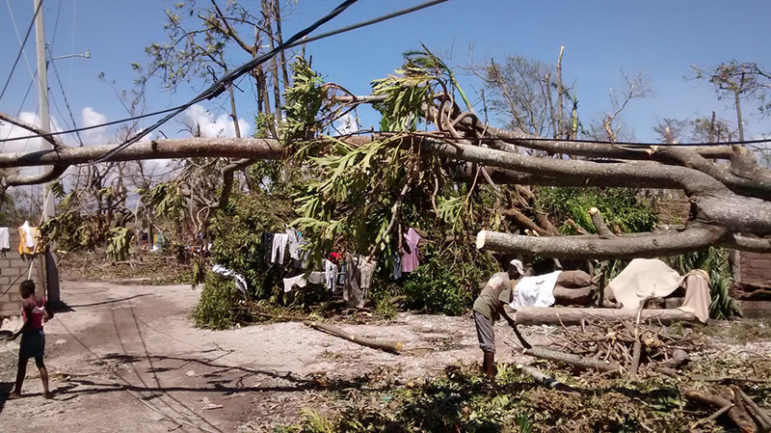
October 10, 2016; Boston Globe
Hurricane Matthew is the worst storm to strike Haiti in more than 50 years and the worst natural disaster to hit since the earthquake of 2010. Bereft of viable infrastructure, resources, and a trusted government, Haiti struggled to prepare and is now all but paralyzed by the same limitations. The devastation and loss of life cannot be overestimated. This is how the Boston Globe begins its latest report:
At least 470 people were found dead in a single district of Haiti’s southwest region, civil defense officials said Saturday, as the country’s estimated death toll from Hurricane Matthew rose to nearly 900.
While shipments of food and medicine are on the way by land and sea, aid workers estimate that a half-million people along Haiti’s southern coast have still had not been reached by rescuers on Saturday, three days after Matthew hit as a Category 4 storm.
The death toll is rising on a daily basis. The hard-hit regions to the south have no communication and power. Roads and bridges are knocked out. People who rely primarily on subsistence farming lost everything. Food and clean water are scarce.
Exacerbating the relief effort is the resurgence of cholera, the deadly waterborne infection inadvertently introduced to Haiti by UN peacekeepers in 2010. Cholera causes severe dehydration and can be fatal in a matter of hours if untreated, especially for children. Despite all the relief aid through the years, and because of Haiti’s successive governments’ lack of money and power, for most Haitians the public sanitation system is still an open field or a public canal, or for those who can afford one, an outhouse.
Sign up for our free newsletters
Subscribe to NPQ's newsletters to have our top stories delivered directly to your inbox.
By signing up, you agree to our privacy policy and terms of use, and to receive messages from NPQ and our partners.
The UN’s Central Emergency Response Fund said in a statement on Friday that, “In 2016 almost 27,000 cholera cases have been reported in Haiti, and over 240 people have died. […] Hurricane Matthew is feared to significantly worsen the situation and increase the risk of a larger outbreak.”
Haiti’s earthquake drew more than $9 billion in assistance. The UN estimates that it would cost Haiti $1.6 billion to build a nationwide water and sanitation system. In 2012, the World Health Organization (WHO) estimated that sanitation infrastructures yield a fivefold return on investment. “Inadequate sanitation can sap as much as seven per cent of GDP per year.” Is that not an opportunity for impact investments? Where did all the disaster response money go, and why is Haiti’s infrastructure still so abysmal?
Since the 2010 earthquake, the UNDP has been working with Haiti’s Directorate of Civil Protection to develop a national disaster risk management system for sustainable development, yet Haiti’s National Directorate for Potable Water and Sanitation has a staff of nine to serve the needs of more than 10 million people. For Haiti to truly change for the better, the UN, countries, and international aid organizations must change the way they relate to Haiti—before the next natural disaster.
Haiti needs billions of dollars coordinated and committed to create a national infrastructure that can withstand natural disasters. For all the money and effort invested through the decades, Haiti remains the poorest country in the Americas and one of the poorest in the world. According to the World Bank, “more than 6 million out of 10.4 million (59 percent) Haitians live under the national poverty line of US$ 2.42 per day and over 2.5 million (24 percent) live under the national extreme poverty line of US$1.23 per day.”
Slavery, revolt, oppression, despoliation, American occupation alternating with American neglect, political violence, coups, gangs, earthquakes, hurricanes, and floods describe much of Haiti’s history. Aid is fleeting. Grand political plans to save the country are more often than not eventually regretted. Why is Haiti’s unrelenting suffering not an irresistible challenge to the billionaire philanthropists? Zuckerberg and Chan pledged in their letter to their daughter to commit forty-five billion dollars to fight against poverty. Some $1.6 billion will give Haitians clean water and sanitation. What philanthropic investment could leverage more good and right more wrongs suffered by the Haitian population than that?—James Schaffer
This newswire has been altered from its initial form. A paragraph describing recent turmoil in the country of Haiti has been removed.













